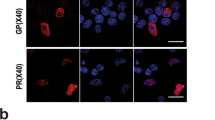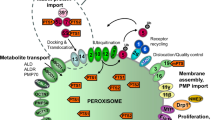Abstract
Various molecular processes including unfolded protein response, protein transport, synaptic transmission and transcription are implicated in the pathology of polyglutamine diseases caused by the expanded polyglutamine-containing proteins. More than 20 transcription-related factors have been reported to interact with disease proteins, and the pathological interaction is known to repress gene expression. The whole shape of nuclear events evoked by disease proteins is now emerging with information on these transcription-related factors and with findings on the similarity between nuclear bodies and pathological inclusion bodies. This article reviews ‘transcription theory’, a rapidly growing hypothesis in polyglutamine diseases.
Similar content being viewed by others
Author information
Authors and Affiliations
Corresponding author
Additional information
Received 14 January 2003; received after revision 20 February 2003; accepted 31 March 2003
Rights and permissions
About this article
Cite this article
Okazawa, H. Polyglutamine diseases: a transcription disorder?. CMLS, Cell. Mol. Life Sci. 60, 1427–1439 (2003). https://doi.org/10.1007/s00018-003-3013-z
Issue Date:
DOI: https://doi.org/10.1007/s00018-003-3013-z




